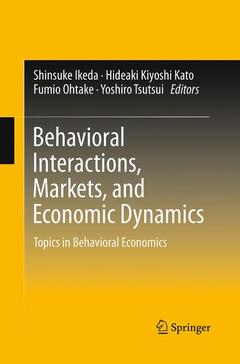Behavioral Interactions, Markets, and Economic Dynamics, Softcover reprint of the original 1st ed. 2016 Topics in Behavioral Economics
Coordonnateurs : Ikeda Shinsuke, Kato Hideaki Kiyoshi, Ohtake Fumio, Tsutsui Yoshiro

Editors
Shinsuke Ikeda is a professor at the Institute of Social and Economic Research (ISER), Osaka University and serves as the director of the Research Centre of Behavioral Economics in ISER. He got a B.Com. of Kobe University in 1980 and a Ph.D. (Doctor) of Osaka University (economics) in 1997. He was the former president of the Association of Behavioral Economics and Finance. He published articles on behavioral economics, macroeconomic dynamics and asset pricing in Journal of Finance, Journal of Health Economics, Journal of International Economics, Journal of Monetary Economics, International Economic Review, etc. His work on behavioral economics is incorporated into the book Economics of Self-Destructive Choices, Springer, to appear in 2015.
Hideaki Kiyoshi Kato is a professor of finance at Graduate School of Economics, Nagoya University, Nagoya, Japan. Before joining Nagoya University, he taught at Kobe University. He received his Ph.D. degree from the University of Utah in 1985. He has published several books and more than 30 articles in the leading finance journals such as Review of Financial Studies, Management Science, Journal of Financial Economics, Journal of Financial and Quantitative Analysis, International Review of Finance, Japan and the World Economy, Pacific Basin Finance Journal, Journal of Portfolio Management, Journal of Financial Research, Journal of Banking and Finance, and Journal of Futures Markets on subjects including the market efficiency and anomalies, stock options, investor behavior, dividend policy, equity offerings, and stock index futures. He is currently an associate editor of Pacific Basin Finance Journal and International Review of Finance.
Fumio Ohtake is Osaka University distinguished professor and a professor in the Institute of Social and Economic Research at Osaka University and an executive vice president of Osaka University. He earned his M.A. and a Ph.D. from Osaka Unive
Collects for the first time works on behavioral economics/finance by representative Japanese authors
Adds and expounds original supplementary data on related research and recent advances for all topics
Covers a broad range of topics from behavioral economics to finance and from preferences to happiness
Includes supplementary material: sn.pub/extras
Date de parution : 08-2016
Ouvrage de 669 p.
15.5x23.5 cm
Disponible chez l'éditeur (délai d'approvisionnement : 15 jours).
Prix indicatif 105,49 €
Ajouter au panierDate de parution : 09-2015
Ouvrage de 669 p.
15.5x23.5 cm
Disponible chez l'éditeur (délai d'approvisionnement : 15 jours).
Prix indicatif 105,49 €
Ajouter au panierThèmes de Behavioral Interactions, Markets, and Economic Dynamics :
Mots-clés :
Behavioral economics; Behavioral finance; Happiness; Risk; Time discounting



